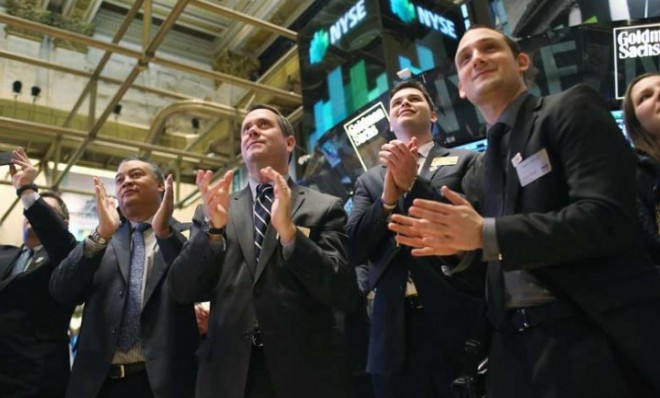Why the stock market boom doesn't signal an economic recovery
The clamoring bells of the New York Stock Exchange are far removed from the financial realities of most Americans

A free daily email with the biggest news stories of the day – and the best features from TheWeek.com
You are now subscribed
Your newsletter sign-up was successful
The S&P 500 is coming off one of its strongest runs in years. The index enjoyed an eight-day winning streak earlier this month that saw it close above 1,500 for the first time since 2007. And the S&P isn't alone. All three major indices have come out swinging in 2013, with each up several percentage points since the start of the year.
But before you pop the champagne and declare 2013 the Year of the Booming Economy, take a breath. Beyond the stock market, the wider U.S. economy still has a whole bunch of problems.
Sure, rising earnings at publicly listed companies such as Proctor & Gamble and Starbucks have led to strong returns for some investors. But most of the gains on Wall Street are far removed from the economic woes that continue to drag down the overall economy, namely the slow-growth environment that is not expected to go away anytime soon. Indeed, America's GDP contracted in the fourth quarter of 2012.
The Week
Escape your echo chamber. Get the facts behind the news, plus analysis from multiple perspectives.

Sign up for The Week's Free Newsletters
From our morning news briefing to a weekly Good News Newsletter, get the best of The Week delivered directly to your inbox.
From our morning news briefing to a weekly Good News Newsletter, get the best of The Week delivered directly to your inbox.
Meanwhile, consumer spending — which accounts for roughly two-thirds of U.S. economic activity — is likely to take a small hit from a 2 percent payroll tax increase that took effect on Jan. 1. The tax hike came as a result of the fiscal cliff agreement, which did not renew a temporary payroll tax reduction, returning the rate from 4.2 percent to 6.2 percent. If you haven't noticed that on your paycheck yet, you will soon.
Though unemployment has fallen to 7.8 percent, its lowest level in four years, Friday's labor report is not expected to deliver any meaningful improvement for those who have been jobless for more than 27 weeks, a group that makes up nearly 40 percent of unemployed Americans.
Of course, it's not all bad. The manufacturing sector just recorded its fastest growth rate since March 2011, thanks to a rise in domestic demand. The U.S. housing market has also witnessed a slight resurgence, although many experts are not predicting any sea change in home prices during the next five years. And as Briklin Dwyer, an economist at BNP Paribas tells Reuters, both manufacturing and housing "need to show bigger improvement for quite some time to affect the broader economy."
Undoubtedly, the booming stock market is not a bad thing — and it'll surely line the pockets of many, many investors. But we should all be wary of reading too much into it. For most Americans, the stock market and the economy are two very different things.
A free daily email with the biggest news stories of the day – and the best features from TheWeek.com
-
 Political cartoons for February 21
Political cartoons for February 21Cartoons Saturday’s political cartoons include consequences, secrets, and more
-
 Crisis in Cuba: a ‘golden opportunity’ for Washington?
Crisis in Cuba: a ‘golden opportunity’ for Washington?Talking Point The Trump administration is applying the pressure, and with Latin America swinging to the right, Havana is becoming more ‘politically isolated’
-
 5 thoroughly redacted cartoons about Pam Bondi protecting predators
5 thoroughly redacted cartoons about Pam Bondi protecting predatorsCartoons Artists take on the real victim, types of protection, and more